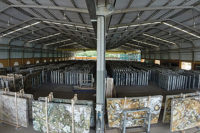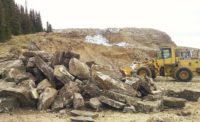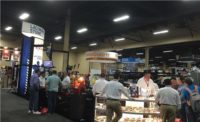A company that is known for its “family owned and operated” business aesthetic, it also has deep quarrying roots and a rich history. With determination and commitment, the Sons, Bill (“Senior”) and Bob expanded the quarry’s production in the early years. Under the leadership of Bill, the quarry grew and eventually became known as Eden Stone.
"Each quarry location has its own challenges” -
Peter Roehrig, Corporate Vice President/General Manager of Eden Stone
With the acquisition of the Valders quarry in 1992, the family company adopted another reputable stone resource, known internationally for its architectural stone cladding and specialty operation, to build on Senior’s dream. Along with a business expansion, the company also gained a quarry with origins that date back to 1906.
For nearly 50 years, Valders Stone produced lump lime for masonry plaster, quarried stone and crushed lime. In 1957, Valders entered into the building materials market with a job to produce limestone riprap for shoreline protection and a prompting from a government inspection engineer. Beginning with one wire saw to cut large stone blocks into slabs for the dimensional stone market, by 1978 the company had purchased two large circular diamond blade saws and had a new building to house them.
Now the partnership of Eden and Valders is a growing company comprised of eight quarry locations with its main focus on the customer, the quality of their products and output and the quality of the workplace. “Our business philosophy is to provide high-quality building and landscape natural stone products at competitive prices to our customers in North America and overseas,” explained Peter Roehrig, Corporate Vice President/General Manager. “In the process, we are committed to the safety and well being of our employees, the protection of our environment and the continual improvement of conservation measures focused on energy and resource.”
The quarries
In total, the eight quarries of Eden and Valders Stone extract an average of more than 6,600 tons of stone a month. Depending on the quarry, there are varied methods of extraction used. At the Valders division, which serves as a custom-cut stone fabricator, “nudge blasting” is primarily used. Roehrig explained that at this location, the extraction method starts with the wall being drilled 9 feet back from the face. The drilling goes for the depth of the wall height, and the drill holes are 18 inches on center the length of the wall, which varies in height from 10 feet up to 20 feet.
The walls of the Valders quarry are shot with just enough explosive to separate the stone and loosen the stone wall block material. The blocks are removed, re-drilled and sized using Dexpan, a non-explosive agent that expands and does not shock the rest of the rock. The blocks are then inspected, marked and inventoried for use on projects. The typical dimensions of cut stone blocks are 8 feet long, 4 to 6 feet wide and 3 to 6 feet high.
At the Eden quarry — which primarily produces veneer blends, landscape materials and some custom material — a simpler extraction method is employed for harvesting the stone. Roehrig explained that the layers are “peeled” using forklifts after shallow holes are drilled, and small explosive charges are used to loosen the layers to be harvested.
For the extraction of these materials, Caterpillar and Volvo end loaders, Caterpillar backhoes, Caterpillar and Volvo heavy haul trucks and Sandvik/Tamrock drilling rigs are used at all of the company’s quarries.
As is the case in many quarry operations, at each quarry of the company there are challenges that arise, but they are overcome accordingly. “Each quarry location has its own challenges,” said Roehrig. “In certain quarries, the layers of overburden and earth as well as material to be shot and crushed as aggregate, are creating an expensive process to access the stone layers we need. In some areas, high groundwater requires pumping to vacate the water to perform the quarrying tasks.
“Regulatory issues are always a challenge to deal with and are placed upon every quarry by townships, at a county level, state level and Federal level,” he continued. “MSHA [Mine Safety and Health Administration] regulation has become a particularly onerous process to deal with due to vague language in the standards and the power given to their inspectors to base their citations on their personal interpretations of a rule versus a finite and defined rule or standard. It has become impossible to anticipate their interpretation so consequently, we have no opportunity for complete compliance. At the same time, they continue to expand their power and their punitive approach to the rights of the mine owners and operators.”
With materials from eight quarries of Eden and Valders Stone, the company expects to have a reserve that will last them well into the future. “We anticipate to have a reserve of the various stone materials for the next 50 years without any major acquisitions,” said Roehrig. “Also we are looking at converting scrap material into saleable [dimensional stone] products to more fully utilize the larger material rather than have it crushed into aggregate.”
The output
Growing and expanding for the last 60 years, Eden and Valders Stone provides a full line of natural stone offerings that includes, but is not limited to, building veneers, thin building veneers, landscape stone, paving, wall panels, stairs treads and balustrade, coping/caps, profiled accents and other dimensional stone products.
“Eden Stone Company produces and maintains an inventory of their stone products,” explained Roehrig. “This is possible due to the predetermined categories of product they have developed. Veneer blends have been established and are sold as such. Landscape materials can be segregated by size, finish and type so they too can be inventoried and sold from stock. While some custom material is produced, most material from Eden Stone is staged and available for sale with a short turnaround for the customer. This also allows Eden to use a distributor-based sales network as one of the primary ways to deliver their products to market. Some of their sales are bid direct also, depending on the size of the project and other direct-sale competition.
“Valders Stone is a custom-cut stone fabricator and produces very little product that can be considered ‘stock’ material,” he continued. “The majority of the customer base for Valders Stone operates in the bid, spec and negotiated realm of construction projects. Valders dedicates much of their marketing to the design, contractor and owner community to get their products selected or specified. Valders and Eden Stone have developed and authored four programs to date through the Building Stone Institute and have received accreditation of these programs from the AIA and the ASLA for CEU credit for registered architects.”
The production
To have this kind of output, the Eden quarry employs 100 to 130 employees, and Valders has about 55 workers, seasonally. “Our combined employee retention average is around 3.5 times greater than our industry’s average,” added Roehrig.
A range of equipment is in place at the processing facilities, depending on the finished product that is desired. Blocks are cut on 11.5-foot-diameter rotary saws from Wilson Industrial Electric, and stone is further cut as needed using bridge saws from Park Industries. Stone is split using Hydra-Split guillotines from Park Industries.
The company also operates several programmable multi-head saws and edging equipment from Loffler, and gauging and honing/polishing equipment is from Simec and Sawing Systems. Also for surface finishing, the company has an automated sandblasting line and a flaming/bushhamering machine from Pellegrini of Italy.
More complex processing is done using Ravelli CNC stoneworking centers and a Flow waterjet, and smaller equipment such as lathes and rock-facers are utilized as needed.
The processing facility also has Donaldson Torit dust collectors and two water treatment systems from Matec.
In a company that has steadily grown over the last four generations, it is no surprise that the family business is thinking about the future generations and looking to stay on top of the market. “Like many other companies, we tried to be proactive by improving our efficiencies and strategies during the recession,” explained Roehrig. “Part of our efforts included implementing ‘Lean’ manufacturing tactics within our production departments. We’ve been very pleased with the results so far. Our Valders facility has improved visibility by enhancing their communication systems.
Since then, we’ve seen an improvement with our on-time delivery statistics, product flow and material utilization. In Eden, we’ve established a new inventory system that has seen cycle count accuracy hit just over 97%. All aspects of production are looked at to increase value to our customers, even where we prep our customer samples. By moving the sample prep areas closer to production, we’ve improved sample delivery time for both companies. “[Our biggest challenge in production is] being able to remain dynamic enough to evolve our products and processes with the changes in the market and consumer preference or demand,” said Roehrig. “During periods of growth, it is always a challenge to dedicate the right amount of focus and energy to the future of the company.”
















